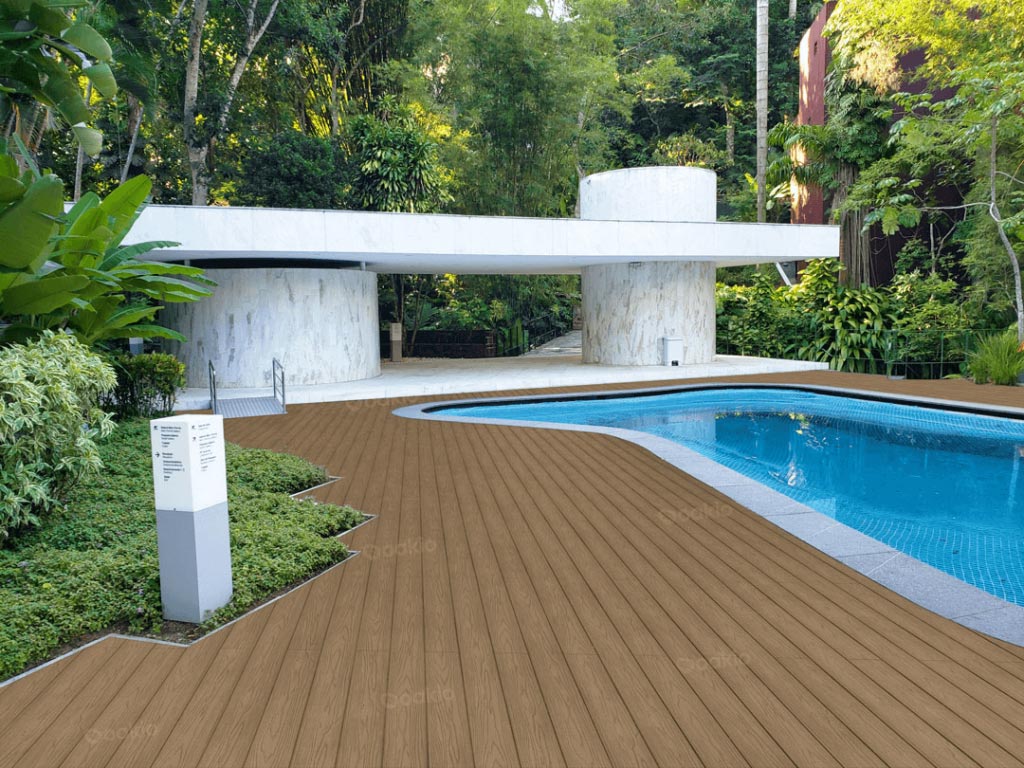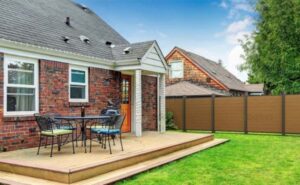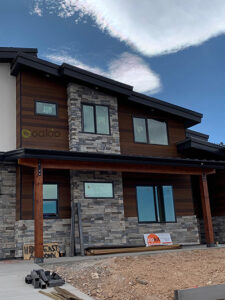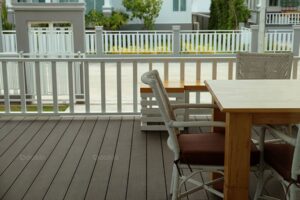Deck vs. Patio: What Are The Differences?
If you have an outdoor space and you want to transform it into a space where fun and relaxation are present, you must choose between a patio or a deck. After all, both have transformed the way we treat our outdoor spaces on a positive note.
But when it comes to a head-to-head, which could be the winner in a deck vs. patio match-up? Which is the most beneficial, and which is the most cost-effective? If this is your first time to face this dilemma, we understand it’s hard to choose.
So, in this article, we’ll share the differences between a deck and a patio, their pros and cons, and which is better overall. Read on and discover which outdoor space feature would come out on top!
What Is A Deck?
In this deck vs patio showdown, let’s tackle the deck first. A deck is an outdoor space feature that is attached to your house. Decks are usually made of wood, but other deck types, like composites, are making the rounds as a better solution than other types of decks.
READ MORE: How To Choose High-Quality Composite Decking
Decks provide an elevated space for you to enjoy various activities, such as taking a morning coffee, chatting with your family or friends, and cooking and eating.
Location
A deck’s location can vary depending on a property’s design and specification, but generally, it is elevated and located beside a house since it needs to attach to a house’s frame. You can have a deck in your backyard, front yard, and side yard.
Size
The deck size varies depending on your preference and the available space on your property. Some small decks can be a simple extension of your living room, while some are big enough to have their own areas, such as seating, grilling, or lounge areas—some even have dedicated dining areas.
Construction
Decks are typically made from traditional wood, composites, or PVC. A composite deck may be better than the two for its long-lasting, low-maintenance quality. Wood typically needs meticulous maintenance since they’re prone to premature damage.
READ MORE: Advantages of Wood Plastic Composite Decking
Pros
- Heat and UV-resistant
- Offers great views of the outdoors
- Highly customizable and DIY-friendly
- Improves home’s overall aesthetics
- Works well on uneven ground
Cons
- It still requires a bit of maintenance
- Initially more expensive than patios
- Needs permit to construct one
- Has weight restrictions
What Is A Patio?
A patio is a commonly paved outdoor space connected to a house. Patios are primarily used for recreational activities, dining, entertainment, or relaxation. They are often made with bricks, concrete, or natural stones.
Unlike decks, where they’re usually elevated, a patio is level with the ground and may or may not have cover for the elements, such as sunlight and rain.
Location
A patio is commonly located beside a house, functioning as an extension of the indoor living space of that house. Like a deck, a patio can be located in a property’s back, front, or side yard. Some upscale patios are situated near a pool or a garden rather than the house itself.
Size
Patio sizes vary depending on different factors, such as the owner’s preferences, existing architectural limitations, available outdoor space, and the purpose of the patio. Some are small, which is good for personal relaxation and small occasions, while some are big enough to host a big party.
Construction
Patios are commonly made with a variety of materials, such as concrete, bricks, natural stones, or gravel. Some high-end patios are made from a hybrid of these materials and often include recessed LED lights installed directly in the patio.
Pros
- More affordable than a deck
- No need for construction permits
- Extremely long lifespan (decades for some materials, others last a lifetime)
- Easier maintenance than decks
- More privacy ensured
Cons
- Requires a more comprehensive construction
- Susceptible to element-related staining
- Prone to cracks (especially when the area has high seismicity)
- Some materials are prone to slipping
- Not suitable for uneven ground
Deck vs. Patio: What Are The Differences?
| Consideration | Decks | Patios |
| Appearance | Can be elevated, providing a platform with a railing and offering a good view of the outdoors. | Ground level, offering a smooth transition from the indoor living space to the outdoors. |
| Cost | More expensive due to the high prices and high amount of materials needed, aside from construction costs. | Less expensive due to lower material costs and amount. Construction may be more meticulous. |
| Upkeep | Requires regular maintenance when based on a traditional wood deck type. Composites are low-maintenance. | Minimal maintenance is required, aside from occasional cleaning and resealing. |
| Durability | Durability varies depending on deck type. Wood tends to live short, and PVC and composites tend to resist more various elements | Highly durable. It can resist a host of elements, though needing a bit of maintenance, especially for pavers. |
| Installation | Needs the construction of support structures and strict adherence to building codes, thus needing a building permit. | It has a simpler installation process but is more meticulous, especially for materials such as stone, pavers, and gravel |
| Lifestyle Considerations | Ideal for properties residing in areas with high elevation or picture-perfect views. | Suitable for valley-like topographical areas. |
| Terrain Considerations | May need terrain modifications, such as soil and ground reinforcements to stabilize support structures. | Only needs mild grading to flatten mild inconsistencies in the ground’s surface. |
| Attachment | Attached to the main substructure of the house for aesthetics and structural purposes. | Can be attached or detached from the house—flexible in attachment preferences. |
| Lifespan | Lifespan varies depending on materials. Traditional wood lasts for more than 10 years, composites last for more than 15-20 years. | Concrete and stone may last a lifetime, pavers and gravel for 50-75 years. |
| Environmental Impact | Wood decks have a high ecological impact due to wood harvesting and manufacturing. PVC and composites may be better. | Super low environmental impact. Even aids natural water drainag e in the case of flooding with gravel, stones, and pavers. |
| Resale Value | Can significantly enhance resale value if the deck is high-quality and regularly maintained. | Patios are attractive to potential buyers, increasing home value. |
Appearance
Decks are usually elevated high above the ground and can offer a panoramic view of the outdoors. The deck’s appearance can be aesthetically pleasing, especially when it’s made with high-quality wood or high-end composite materials.
Patios are flexible in design and can be constructed almost anywhere on your property. A composite deck, in contrast, can be highly customizable, giving you aesthetic freedom.
Cost
Decks are typically more expensive than patios due to the prices of materials and the amount of materials needed. For instance, a basic wood deck may cost anywhere between $15 to $30 per square foot.
A composite deck might cost from $25 to $60, while patios—like concrete ones, may only cost around $6 to $15 per square foot, making concrete a winner on a concrete patio vs wood deck cost showdown.
Upkeep
Traditional wooden decks require regular maintenance to protect them against the elements, such as snow and rain. Some composite products, like Oakio’s Proshield, are practically almost maintenance-free.
In contrast, regardless of the materials used, patios are usually low-maintenance and only require occasional cleaning, resealing, and minor repairs—making patios win the deck vs patio cost upkeep battle.
Durability
A deck’s durability is widely dependent on the material. For instance, wooden decks are prone to rotting, warping, and splintering due to exposure to elements, while composites have high resistance against varying elements.
Patios made of concrete, stones, or bricks are usually unaffected by these elements and only require occasional cleaning and resealing.
Installation
Deck installation is usually more complex and comprehensive than patio construction. Since decks are often elevated and, at times, need to be erected on an elevated geographical area, support structures, and the soil must be reinforced to facilitate stability.
Whereas patio construction is simpler and less time-consuming.
Lifestyle Considerations
Decks are made for people who want an elevated abode where they can enjoy the peace a scenic view gives—all while having the capacity to dine, chit-chat, watch a movie, or host a small party.
Patios are well-suited for people who are into larger outdoor spaces, as patios are usually wider and larger than decks and are suitable for large-scale recreational activities and even plain gatherings.
Terrain Considerations
Decks can be built on uneven terrain and even hilly or sloped terrain when paired with properly engineered support structures, such as footings, beams, and posts. If the ground has risks for subsidence, soil reinforcement may be done.
On the other hand, patios can only be built on flat terrain, with minor slopes and ground imperfections corrected with grading and leveling.
Attachment
Decks are often attached to the house, providing direct indoor and outdoor access. This attachment is also for a structural purpose—the other side of the deck without a support structure is directly bolted into the house’s substructure.
Patios can be attached or detached, giving you design and architectural flexibility. You can get a patio for your garden or pool instead of your house, or go traditional and install one adjacent to your home.
Lifespan
Deck lifespan varies depending on the material. On average, wood lasts 10-20 years, and a composite deck lasts 15-25 years. Patios, in contrast, can last more than 25 years and even a lifetime.
Environmental Impact
Decks have a higher impact when using wood and plastic materials in composites. Patios have a lower impact, especially when made with sustainable materials, such as reclaimed bricks or natural stones.
Resale Value
Both decks and patios can improve the resale value of a property by extending the living space and providing usable recreational space, which homeowners typically look for. Though the exact resale value varies, they can still make an impact.
In the resale value battle of deck vs patio, both are tied.
Deck vs. Patio: Which is Better?
In this showdown, we see both as tied and equal. Both have advantages and disadvantages, and it’s really up to you which one would suit you and your property better. The question “Which is better?” can only be answered by you.
But should you choose to go decking, Oakio is here to offer our expertise in building a composite deck for your humble abode! Check out our Decking Calculator for an estimate and see how it would look on a property with our Product Visualizer. We pride ourselves in our industry-leading reputation and are committed to giving you the best deck for your home!
Loved this article? Subscribe to our newsletter today to read our latest blogs and be the first to know about our exclusive deals and discounts!
Trending Reading
What Are the Differences Between the WPC Board and PVC Board?
[2024 Update] How Long Does WPC Decking Last?











